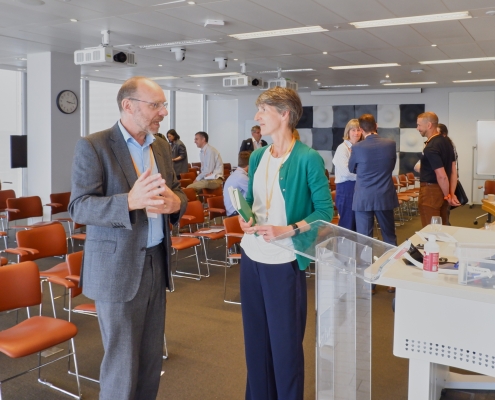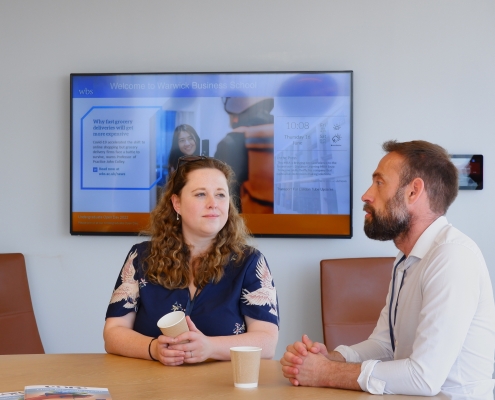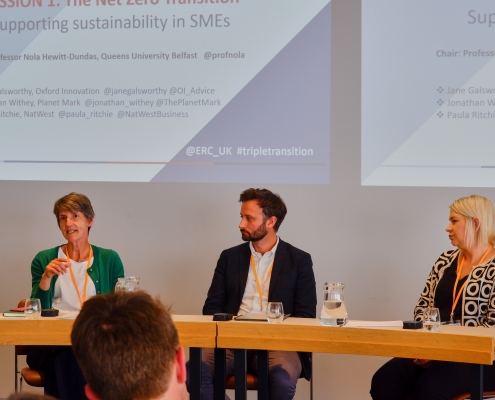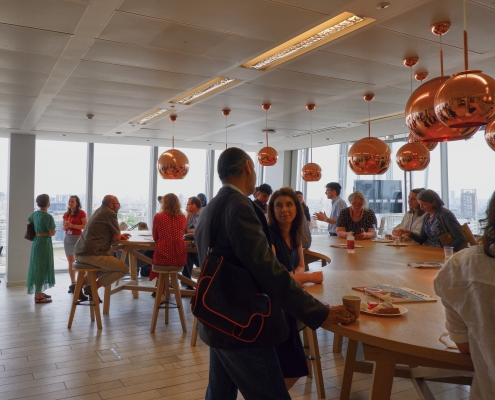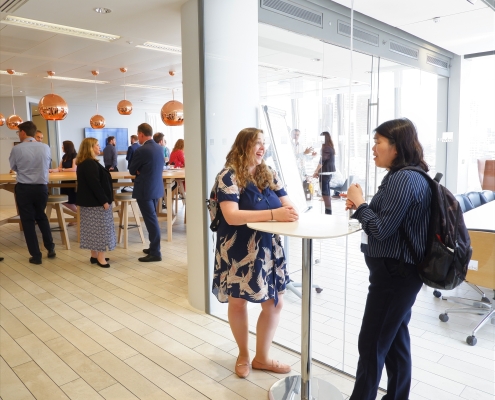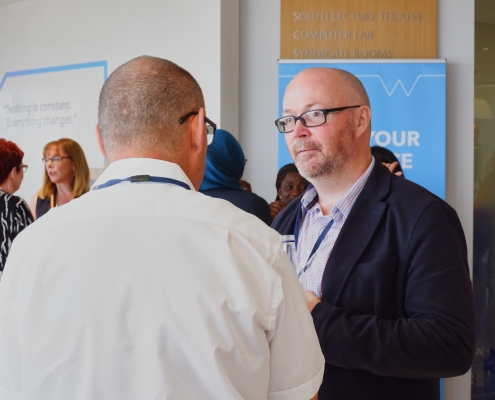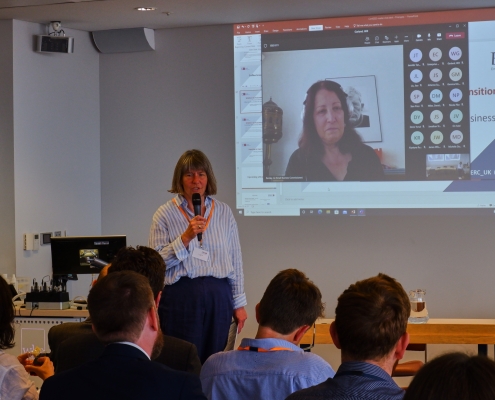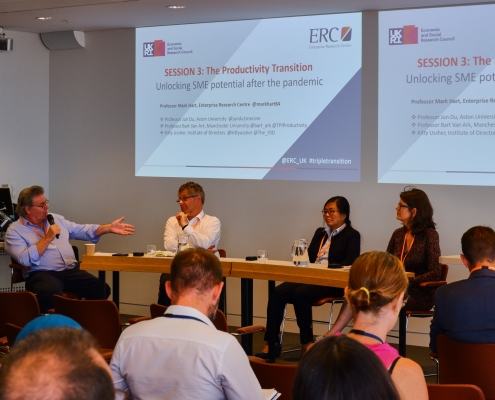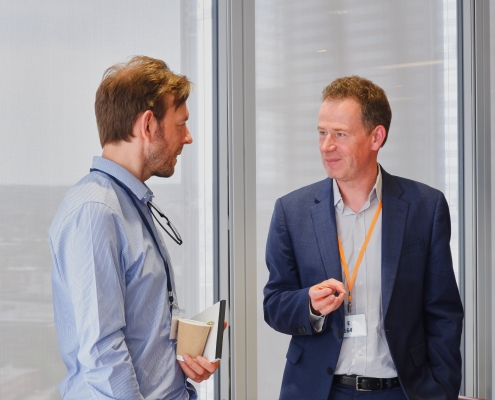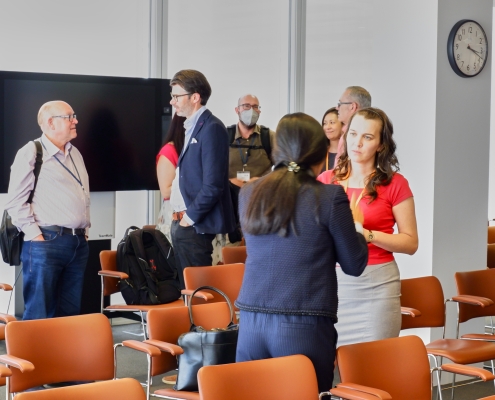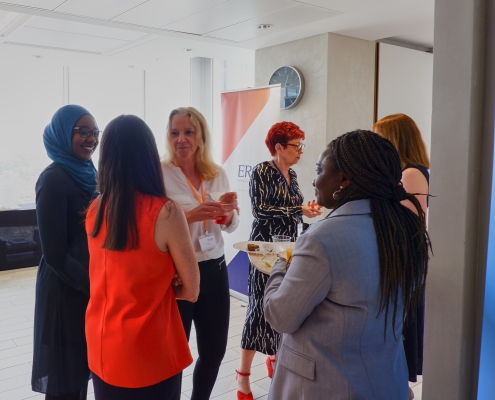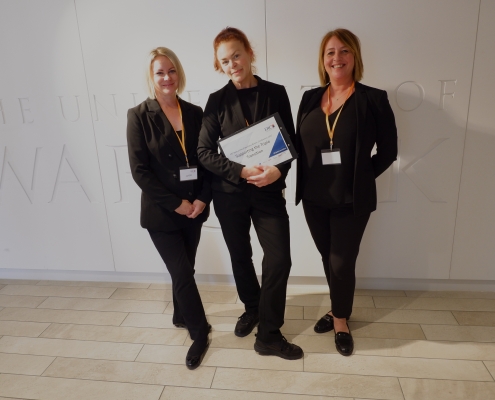Supporting the Triple Transition
On a sunny morning on 16th June, we welcomed delegates back to The Shard for our first in-person ERC State of Small Business Britain conference since 2019. The conference, which was chaired this year by Lucy Armstrong, focused on the theme of the ‘triple transition’, or the question of how moves towards net zero and digitalisation might drive future productivity improvements in SMEs.
Stephen Roper, Director of the ERC, opened by introducing the idea of the triple transition, and setting the question to frame the day’s discussion, namely, how can we shape policy, regulation, and the innovation eco-system to maximise the productivity benefits of the digital and net zero transition?
The first session of the day focused on the net zero transition. Matt Adey of the British Business Bank (BBB) gave us some vital context on the state of play with UK SMEs and the net zero transition, drawing on findings from the BBB’s recent survey. Most SMEs are early into their net zero journey, and key barriers are around perceptions of cost and feasibility. Matt concluded that access to finance is part of the solution to drive more action, with a clear role for the BBB in increasing adoption.
Tanya Sheridan of the Royal Society of Chemistry was next to the floor with a focus on how to drive sustainability practices in ‘deeptech’ SMEs in the chemistry sector. These firms provide products and solutions based on novel technological advances, and they are important as they often address big social and environmental challenges. Tanya set out the barriers these firms face in commercialising their ideas, drawing on insights from joint research with the ERC. These barriers include access to finance and facilities, as well as issues with management and leadership skills.
We then moved to a panel session, chaired by Nola Hewitt-Dundas of Queens University Belfast, on the theme of supporting sustainability in SMEs. Panellists Jane Galsworthy (Oxford Innovation Advice), Jonathan Withey (Planet Mark), and Paula Ritchie (NatWest) delved deeper into some of the barriers SMEs face in adopting net zero practices and discussed some possible solutions. How SMEs can consistently measure their progress was key issue to emerge during the discussion and was revisited several times through the day. Other issues touched on were the need for better information for businesses, the need for a stronger, clearer business case, and the importance of tailored advice and financial support.
Our second session of the day began after lunch, and we shifted to focus on the digital transition. We started with a business panel chaired by ERC Deputy Director Mark Hart. SME leaders Darren Joint (Viking Signs) Kavita Parmar (Word360) and John Cushing (mnAI) gave fascinating insights to their digital journeys. We heard inspirational stories of transition during the pandemic, discussed skills challenges, and were given examples of how the use of digital technology can bring sustainability and performance benefits. A second panel, chaired by Lucy Armstrong, went to on to consider what policymakers can do to support SMEs in making the digital transition. Mark Swift (WMG), Karen Licurse (Digital Boost) and Daniel Harrison (Department for Business, Energy and Industrial Strategy), discussed a range of issues, including the crucial importance of providing tailored advice and support, the value of collaboration and networks and the need for a less fragmented business support offer in the UK.
Liz Barclay, the UK’s Small Business Commissioner opened the final session of the day with a keynote speech on the priorities for small businesses. This brought to the fore the financial challenges SMEs face, and the need to act urgently on late payment culture. Liz emphasised that current economic circumstances are a ‘perfect storm’ and many SMEs are under severe pressure. The cost of doing business is the main challenge small businesses face, without tackling this, progress on the investment needed to make the triple transition will be limited.
We then moved to the final expert panel discussion, chaired by the ERC’s Mark Hart. This addressed the question of how we can unlock SME potential after the pandemic. Panellists Jun Du of Aston University, Bart Van Ark of the Productivity Institute and Kitty Ussher of the Institute of Directors had a lively discussion that drew together many of the threads from earlier in the day. Issues highlighted were the need for better access to finance, a recognition of the additional challenges for SMEs brought by Brexit, the need for improvements in both digital and soft skills and in the diffusion of knowledge.
All in all, delegates enjoyed a day packed full of valuable insights on state of Small Business Britain at a time of major challenge and change. On a more personal note, it was great to see people back together again at The Shard, with time to catch up with colleagues, make new connections, and to enjoy the stunning views of course!
Vicki Belt, Deputy Director, ERC
Take a look at our picture gallery from the event
